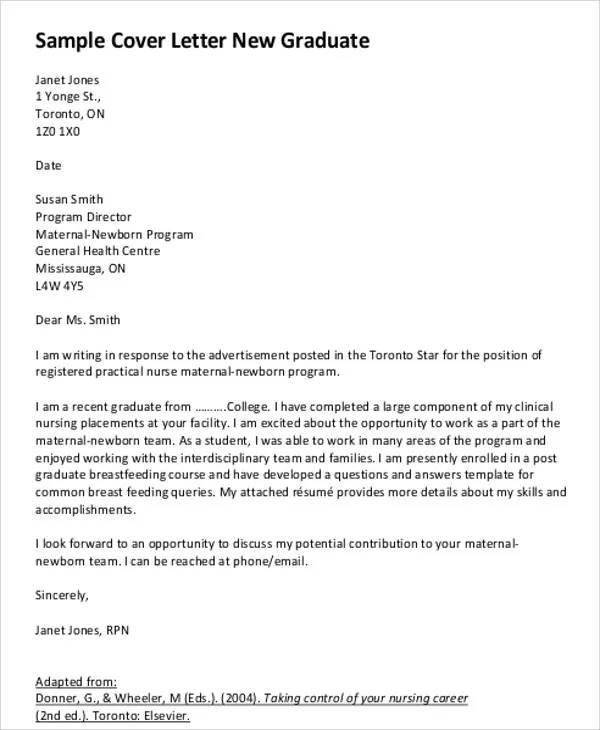Understanding the Importance of a Cover Letter for New Grad RNs
As a new graduate registered nurse (RN), the job market can seem daunting. You may lack the extensive experience of seasoned nurses, but that doesn’t mean you can’t stand out. One of the most critical tools in your job-hunting arsenal is a well-crafted cover letter. It’s your first opportunity to make a strong impression, showcase your potential, and convince hiring managers that you’re the right fit for their team. A compelling cover letter goes beyond simply restating your resume; it allows you to highlight your unique skills, passion for nursing, and career aspirations. It’s your chance to tell your story and explain why you’re excited about this particular opportunity. Remember, a generic application is often overlooked. A personalized cover letter demonstrates your genuine interest and attention to detail, setting you apart from the competition. Your cover letter is your voice, use it wisely.
Highlighting Your Skills and Education
Your cover letter is the ideal place to highlight the skills and knowledge you’ve gained during your nursing education and clinical experiences. Since you are a new grad RN, you may not have years of work experience to list. That’s alright! Focus on transferable skills that you have gathered. Instead of focusing on the lack of experience, frame your cover letter to speak of your passion and willingness to learn new things. This section should provide specific examples of how your skills align with the requirements of the job you are applying for. This strategic alignment shows the hiring manager that you are not just sending out a generic application but that you are genuinely interested in the position and the facility. Using concrete examples from your education or clinical experiences helps solidify your claims and makes your application more memorable.
Education
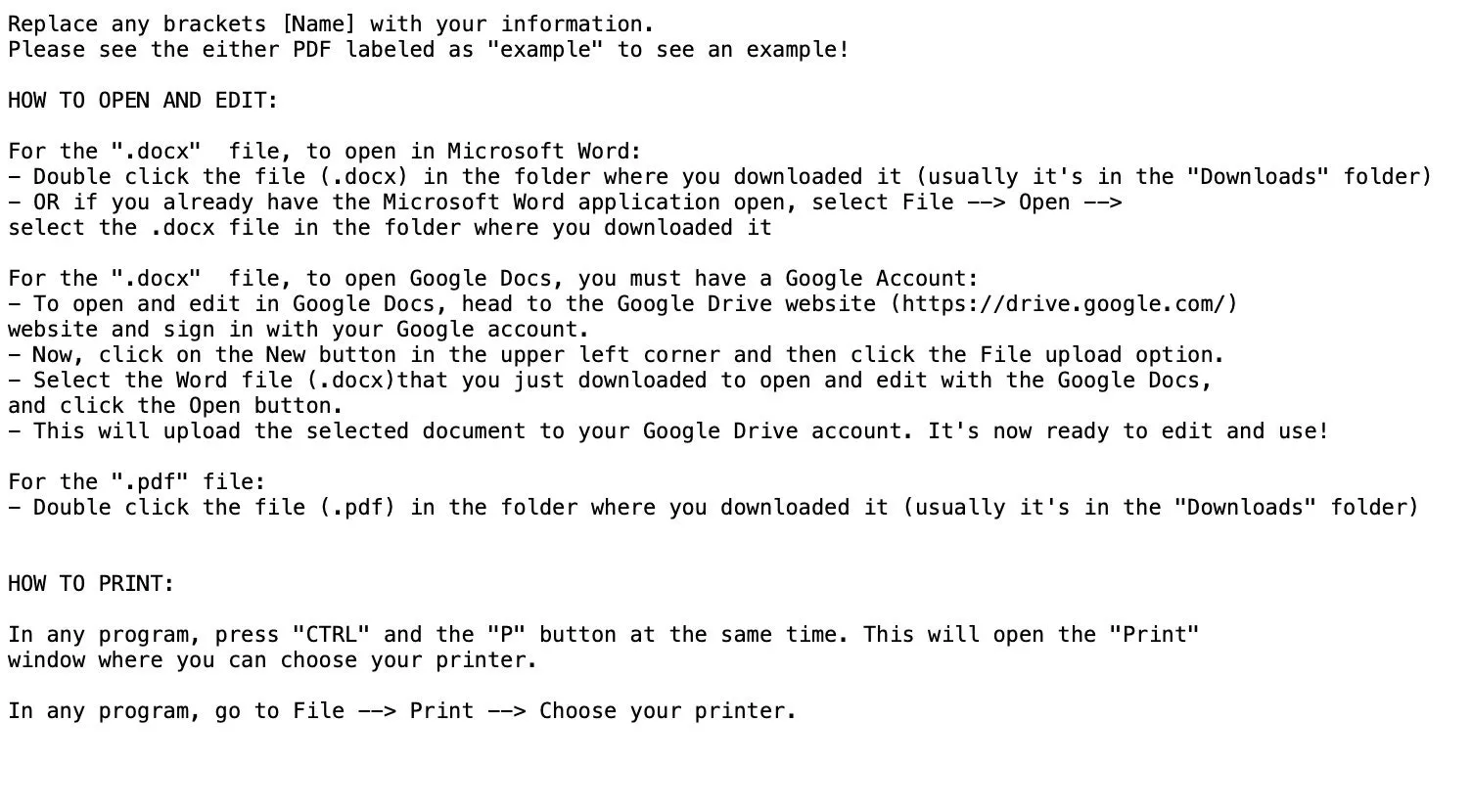
Begin by stating your nursing degree and the institution from which you graduated. Briefly mention any honors, awards, or academic achievements that demonstrate your dedication and excellence. The goal is to showcase your academic foundation and signal to the employer that you have the necessary education to succeed as a nurse. Consider including any specialized training you’ve received, such as certifications in Basic Life Support (BLS) or Advanced Cardiac Life Support (ACLS). These certifications are highly valued in the healthcare industry and can significantly boost your application. Always provide the name of the institution, the degree earned, and the date of graduation (or expected graduation). You can also showcase any relevant academic achievements such as GPA or honors.
Relevant Coursework
Focus on coursework that directly relates to the job description. For instance, if you’re applying for a position in a critical care unit, highlight courses in critical care nursing, pharmacology, or pathophysiology. If the job requires a specific skill set, like wound care or mental health, mention related coursework. If you’re unsure which courses to mention, review the job description carefully to identify key skills and responsibilities. Then, tailor your cover letter to highlight the coursework that aligns with those requirements. Listing specific courses related to the role requirements demonstrates that you have the fundamental knowledge base to begin your career. This signals to employers your proactive approach to skill development and preparation for a nursing role.
Clinical Experience
Describe your clinical experiences, focusing on settings and patient populations you’ve worked with. This section should showcase your experience in various clinical settings and patient populations. Include the names of the hospitals or clinics where you completed your rotations, the units you worked in, and the types of patients you cared for. Whenever possible, quantify your experiences by mentioning the number of patients you assisted or the specific procedures you performed. Think about what you did well. Even if you aren’t experienced, you’ll at least have clinical hours and an understanding of what you were doing.
Patient Care Skills
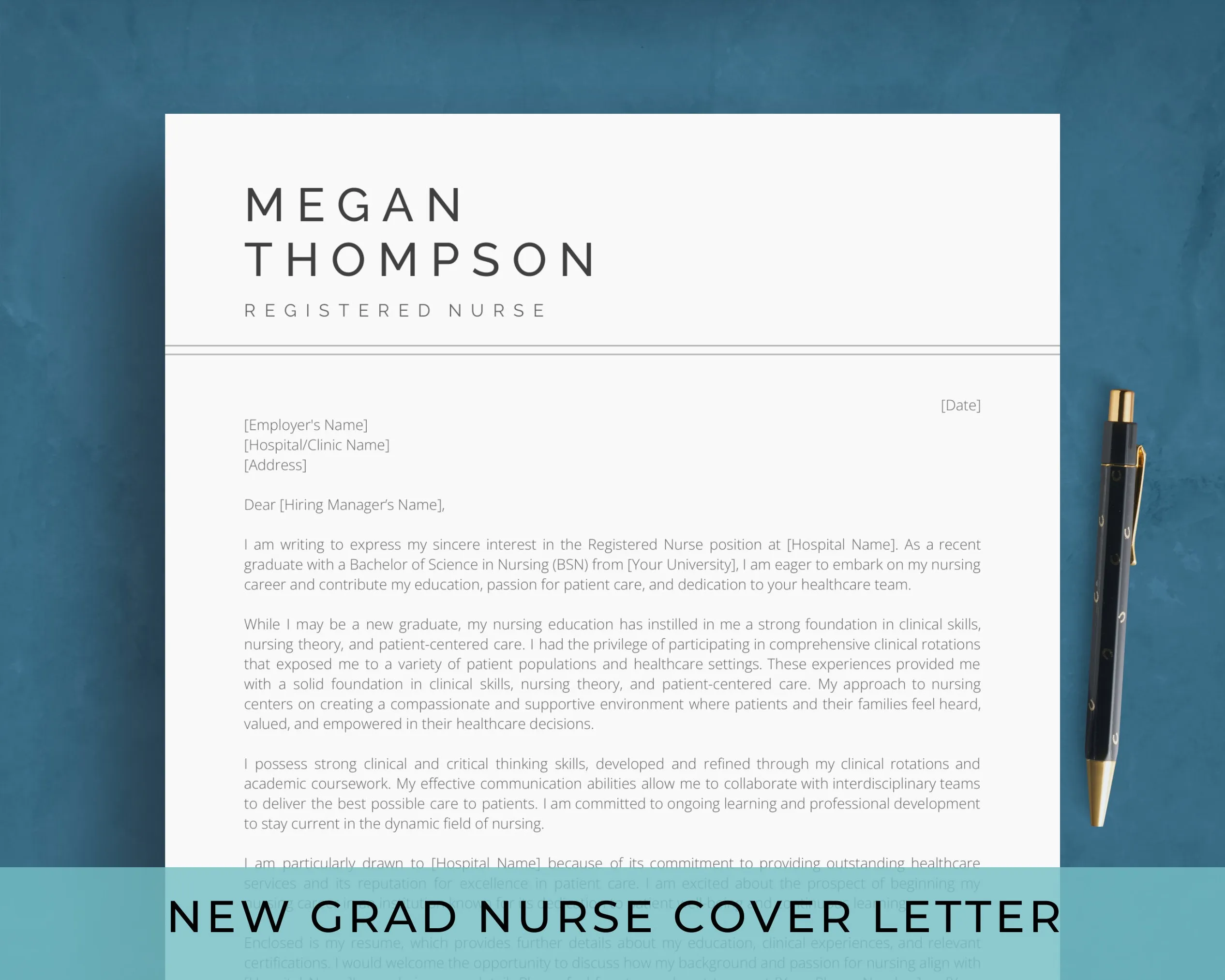
Elaborate on your hands-on patient care skills. Highlight any specialized procedures or skills you have experience with. Examples include medication administration, wound care, IV insertion, patient assessment, and electronic health record documentation. The goal is to provide concrete examples of your abilities. Mention how you adapted your care to meet the unique needs of different patient populations, such as pediatric, geriatric, or critical care patients. This demonstrates your versatility and adaptability. Use your experiences to illustrate your proficiency in these areas, showcasing your competence and preparedness to handle diverse patient care responsibilities.
Soft Skills and Attributes
Nursing is about more than just technical skills; soft skills are essential. Show you have these skills and qualities. Focus on skills such as communication, empathy, critical thinking, and problem-solving. These skills are crucial for effective patient care and teamwork. These skills, which define how you interact with patients and your colleagues, are just as important, if not more so. For instance, include that you possess a strong work ethic, a commitment to continuous learning, and the ability to adapt to fast-paced environments. By incorporating such attributes, you show the hiring manager that you possess the interpersonal skills required to be a successful nurse.
Communication Skills
Effective communication is fundamental in nursing. Highlight your ability to communicate clearly and empathetically with patients, families, and colleagues. Provide examples of how you have successfully communicated complex medical information, resolved conflicts, or provided emotional support. Strong communication skills are critical for building trust with patients, ensuring their needs are understood, and coordinating care with other healthcare professionals. Mention your experience presenting information, leading patient education sessions, or participating in team meetings. Doing so demonstrates your ability to articulate your thoughts clearly and concisely.
Teamwork and Collaboration
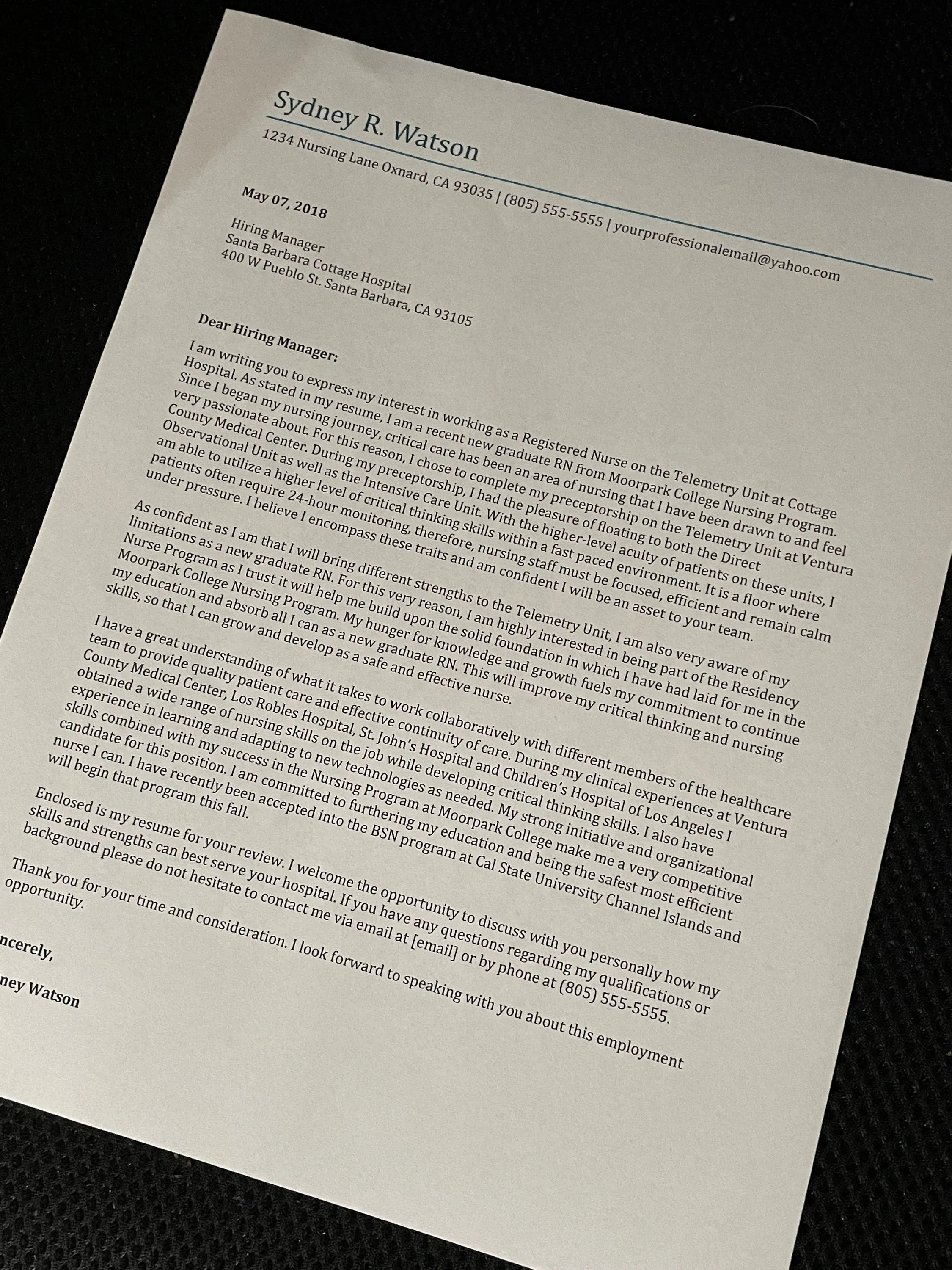
Nurses work as part of a team. Describe your experience working collaboratively with other healthcare professionals. Highlight instances where you worked with doctors, therapists, and other team members to provide coordinated patient care. Give examples of your ability to share information effectively, support your colleagues, and resolve conflicts. Mentioning specific examples of successful teamwork will make your cover letter stand out and underscore your ability to work effectively as part of a team.
Showcasing Your Passion and Career Goals
Your cover letter is the perfect place to express your enthusiasm for nursing and your career aspirations. Expressing your passion and goals can leave a lasting impression on the hiring manager. Explain why you chose nursing as a profession and what motivates you to provide care. Showcase how your values align with the facility’s mission and values. You can express your desire for lifelong learning, professional growth, and advancement within the organization. This section is your opportunity to make a personal connection with the hiring manager and demonstrate that you are not just looking for a job but are genuinely committed to the nursing profession and the specific opportunity.
Expressing Your Interest in the Specific Role
Why are you applying for this specific position? Make sure that you tailor your cover letter to the specific job you are applying for. Review the job description and identify the key responsibilities and skills required. Then, in your cover letter, address how your qualifications and experiences align with those requirements. Mention your interest in the particular unit or specialty the position is in, and describe why it appeals to you. This will show the hiring manager that you understand the role and are interested in the opportunity.
Researching the Healthcare Facility
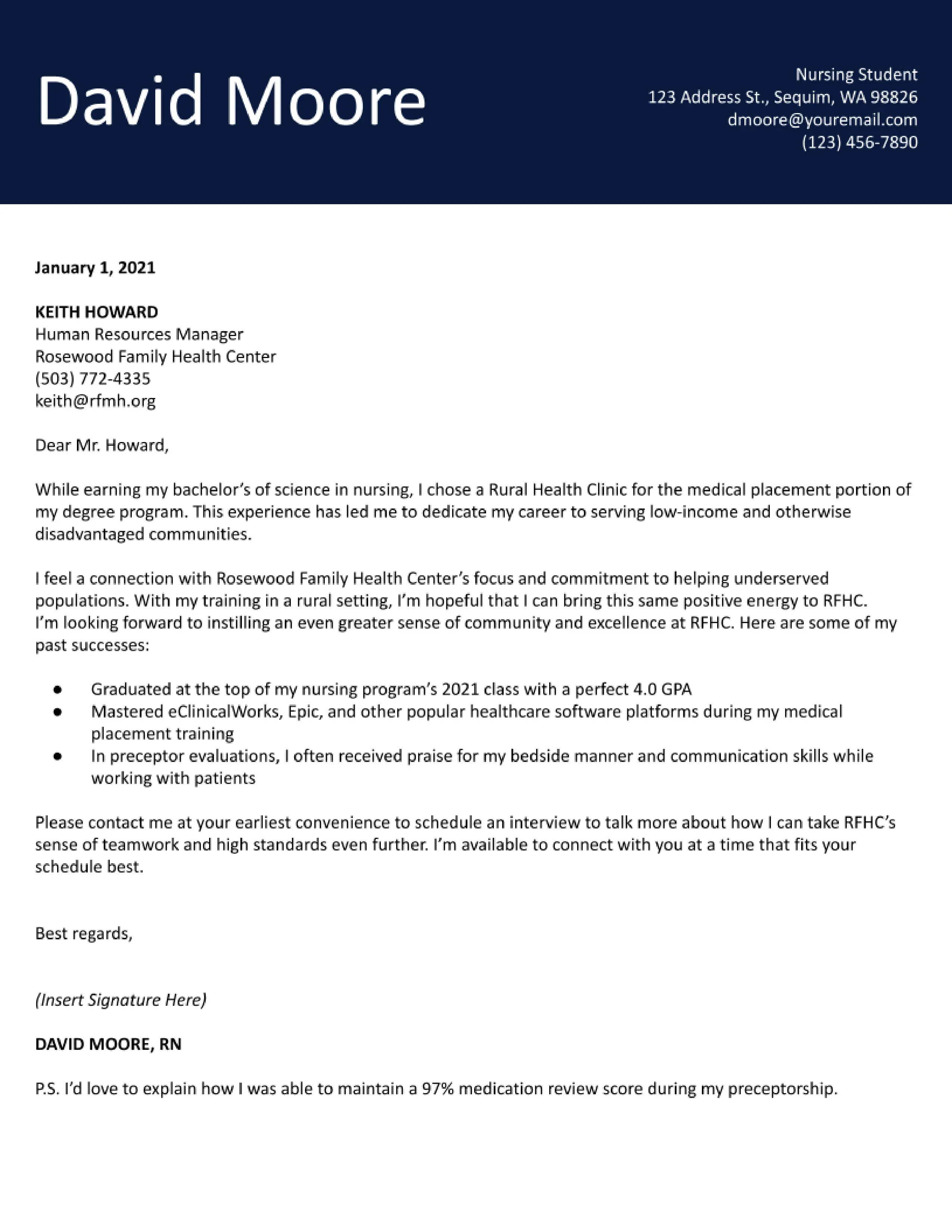
Do your research! Researching the facility shows that you have invested time and effort. Understand the hospital or clinic’s mission, values, and achievements. Tailor your cover letter to align with their specific goals. Referencing specific programs, initiatives, or values that resonate with you shows that you have invested time in understanding the organization. You can find this information on the healthcare facility’s website, social media pages, or through news articles. This will demonstrate your genuine interest in working there.
Tailoring Your Cover Letter
Each cover letter should be unique and tailored to the specific job you are applying for. A generic cover letter will not capture the attention of the hiring manager. Focus on the specific requirements and skills mentioned in the job description. Address how your qualifications and experiences align with those requirements. Use keywords from the job description to show that you understand the role and its expectations. Demonstrating that you have read the job description and are able to meet the requirements is essential for a successful application.
Formatting and Structure
Formatting and structure are key components for a good cover letter. A well-formatted cover letter is easier to read and shows attention to detail. Use a professional and easy-to-read font, such as Times New Roman, Arial, or Calibri. Maintain consistent formatting throughout the document, including font size, spacing, and margins. Divide your cover letter into distinct sections, such as an introduction, skills and education, experience, and a conclusion. A clear structure ensures that your cover letter is easy to follow and allows the reader to quickly find the information they need. Remember, the clearer your cover letter is, the easier it is to get the job.
Using Action Verbs
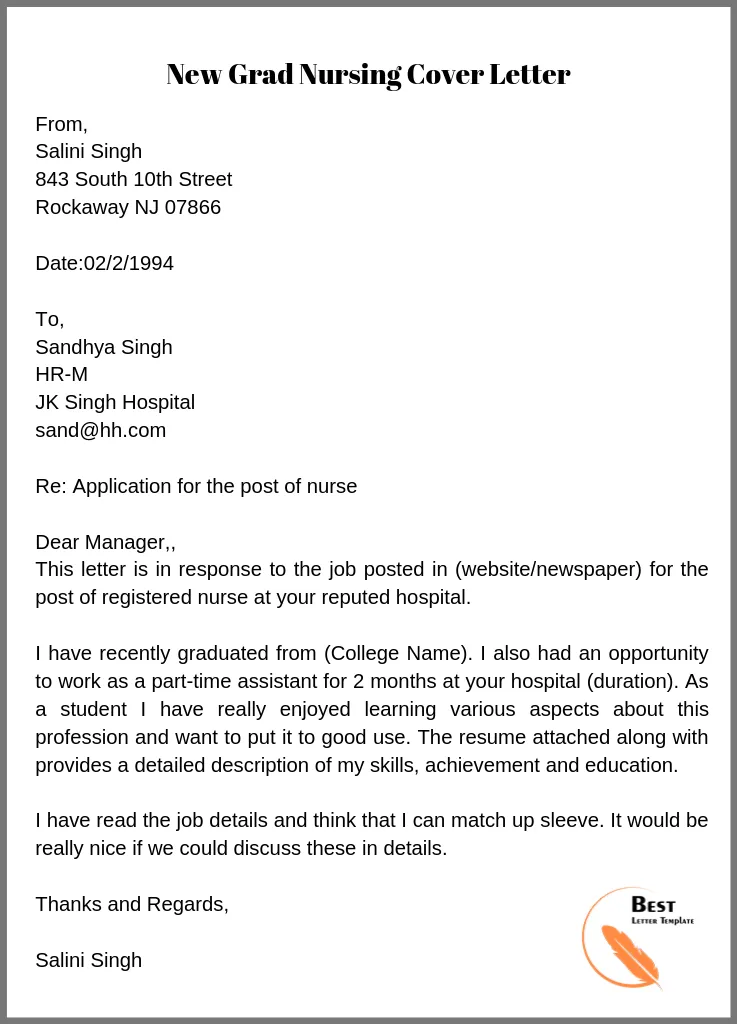
Action verbs are essential for making your cover letter more engaging and impactful. Start each bullet point or sentence with strong action verbs. Examples include “Assessed,” “Administered,” “Collaborated,” “Educated,” “Managed,” and “Implemented.” Action verbs bring your accomplishments to life and demonstrate your skills and experience effectively. They also make your cover letter more dynamic and interesting to read. Using action verbs will emphasize your accomplishments and help you present a compelling case for your candidacy.
Proofreading and Editing
Proofreading is one of the most important steps when writing a cover letter. Before you send your cover letter, carefully proofread it to catch any errors. Check for grammatical errors, spelling mistakes, and typos. Ask a friend, mentor, or career advisor to review your cover letter for any areas of improvement. A polished and error-free cover letter will demonstrate your professionalism and attention to detail. The hiring manager will see you as someone who cares about precision and quality.
Common Mistakes to Avoid
Avoid these mistakes to make your cover letter the best it can be. Even small mistakes can cause your cover letter to be rejected. You want to make sure your application stands out for the right reasons.
Generic Cover Letters
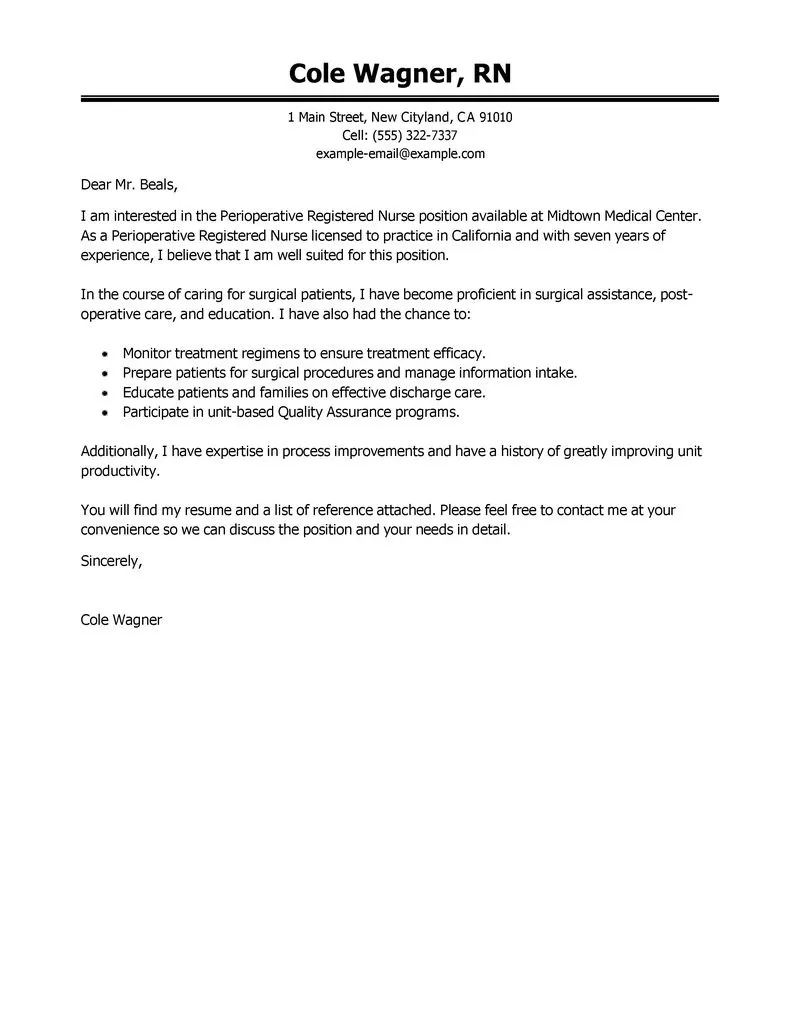
Do not send a generic cover letter. Tailor your letter to each specific job and healthcare facility. A generic cover letter signals a lack of effort. A hiring manager will know if the same letter is sent to every company. Each cover letter should be unique and reflect the specific requirements and values of the organization. Researching the healthcare facility will help you tailor your letter to its needs. Take the time to customize your letter for each application. It will show your genuine interest.
Focusing on What You Lack
Emphasize your strengths and accomplishments, and avoid focusing on your lack of experience. Do not dwell on what you don’t have; focus on what you can offer. Instead of mentioning your lack of years of experience, emphasize your skills, education, and passion. Showcase your transferable skills and demonstrate your willingness to learn. A positive and proactive approach can make a significant difference. Focus on your strengths instead of your perceived weaknesses.
Ignoring the Job Description
Always refer to the job description. Make sure you tailor your cover letter to the specific requirements. You should address the requirements in your letter to show the hiring manager that you’re a good fit. Not following the job description will show that you are not interested in the position. Highlight how your skills and experience align with the listed requirements. This shows that you have taken the time to understand the role. Matching your cover letter to the job description will significantly improve your chances of getting the job.
Creating a Compelling Call to Action
End your cover letter with a clear and compelling call to action. Express your enthusiasm and make it easy for the hiring manager to contact you. State your interest in an interview. Provide your contact information, including your phone number and email address. You want to close the letter by thanking the hiring manager for their time and consideration. A strong call to action will make it easy for the hiring manager to take the next step and invite you for an interview.
